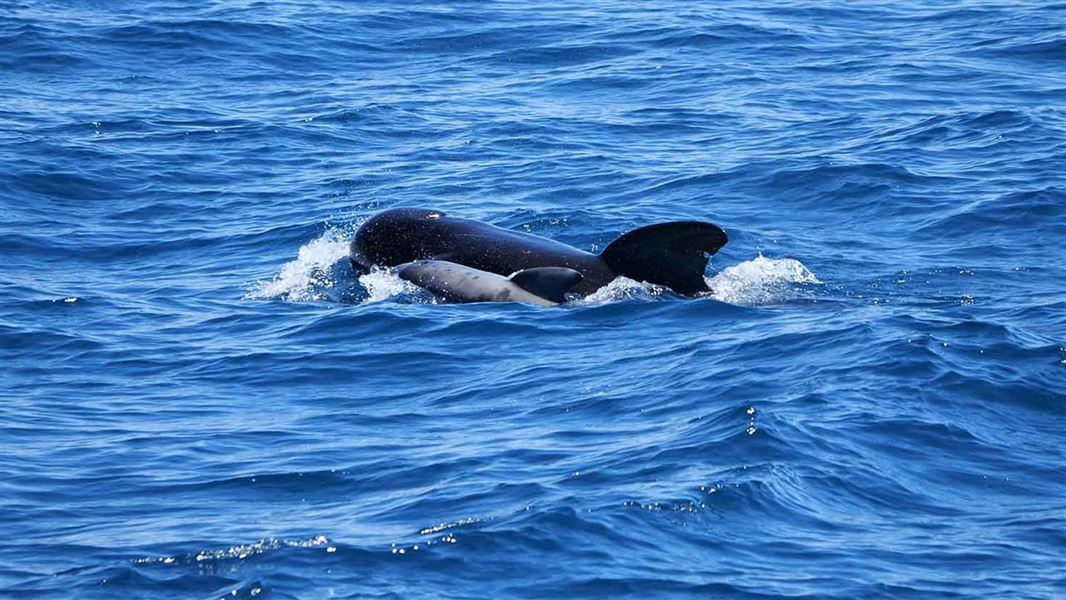
Introduction
A pilot whale stranding at Ruakākā Beach in Northland has sadly seen three adults and one calf die.Date: 24 November 2024
Up to 40 pilot whales were stranded on Ruakākā Beach on 24 November.
DOC and Patuharakeke continue monitoring Ruakākā Beach following the whale stranding.
A DOC team returned to Ruakākā Beach near Whangārei early this morning, and there have been no reports or sightings of a restranding. DOC and local hapū, Patuharakeke, will remain on-site throughout the day to monitor the area for any further strandings.
We encourage the public to stay vigilant along the Bream Bay coastline and report any whale sightings or potential strandings immediately by calling 0800 DOC HOT (0800 362 468).
"The effort on the beach last night was incredible, with everyone coming together for the whales. It's amazing to witness the genuine care and compassion people have shown toward these magnificent animals. This response demonstrates the deep connection we all share with our marine environment, “says Joel Lauterbach, Operations Manager DOC Whangārei
“Patuharakeke have led the on-ground response, and we are deeply grateful for their leadership, as well as the support from Project Jonah and the hundreds of members of the public who have assisted so far. Today, DOC will continue supporting Patuharakeke with the four deceased whales as required.”
Background information
New Zealand has one of the world's highest rates of whale strandings and is recognised as a world leader in successful whale rescues. Much of this success is thanks to DOC and Project Jonah working together, as well as the important support of iwi, local communities and other marine mammal rescue groups and volunteers.
DOC is responsible for managing rescues of stranded whales and dolphins but makes decisions on the direction of the rescue response in consultation with manawhenua iwi, Project Jonah and other marine mammal rescue groups when they are involved.
DOC appreciates the assistance and support of Project Jonah in working with DOC staff to rescue stranded whales and dolphins. Project Jonah marine mammal medics can play a key role in rescues of stranded marine mammals. Those with considerable experience, in particular, can valuably assist DOC staff in the response and management of whale strandings.
Project Jonah’s ability to mobilise large numbers of its marine mammal medics for mass whale and dolphin stranding rescues greatly assists DOC with managing such events.
DOC encourages people wanting to be involved in rescues of stranded marine mammals to attend a Project Jonah Marine Mammal Medic course. Medics who complete this course will be well equipped in rescuing stranded whales and dolphins and can act as a role model to untrained rescuers. Knowing the rescue process, including health and safety risks, enables the process to run more safely and smoothly.
DOC also appreciates other logistical assistance Project Jonah medics can provide at stranding events, including taking on tasks such as providing safety briefings to volunteers or managing traffic and car parking.
Marine mammal strandings in New Zealand
Whales and dolphin strandings have been occurring for millennia and are a natural phenomenon.
New Zealand is a hotspot for marine mammal strandings with most involving just one or two animals.
DOC responds to an average 85 marine mammal stranding incidents a year, mostly of single animals.
The marine mammals that most commonly strand are dolphins, pygmy sperm whales and beaked whales. Most mass strandings are of long-finned pilot whales. Large whales such as sperm whales also occasionally strand.
Mass strandings can involve a few to hundreds of animals.
Contact
For media enquiries contact:
Email: media@doc.govt.nz